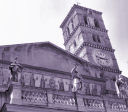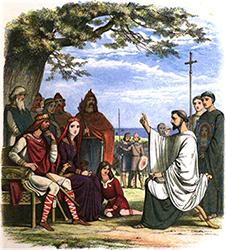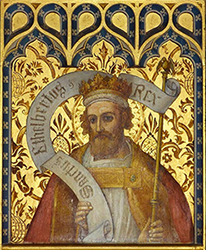Lent: February 24th
Thursday of the Second Week of Lent
Other Commemorations: Ethelbert of Kent, King (RM)
» Enjoy our Liturgical Seasons series of e-books!
"Blessed are they who have kept the word with a generous heart and yield a harvest through perseverance." Today's Gospel tells us that the rich man was interested not in the poor but only in his own fine linens and sumptuous meals. Lazarus, on the other hand, lay in hunger and poverty at the rich man's gates where the dogs licked his sores. The Gospel gives us a glimpse into the tormenting mental anguish of Dives as he compares his own unchangeable punishment in hell with the quiet repose of Lazarus in Abraham's bosom.
Before the reform of the General Roman Calendar this was the feast of St. Matthias, apostle. His feast has been transferred to May 14.
| The Station for today is in the celebrated basilica, St. Mary's across the Tiber. It was consecrated in the third century, under the pontificate of St. Callixtus, and was the first church built in Rome in honor of our blessed Lady. |  |
Meditation - On the Compassion of Some Women of Jerusalem
A goodly number of the women of Jerusalem (not disciples of Jesus) met this saddest of funeral processions. No doubt their weeping and sobbing and loud wailing, however sincere, was not in real accord with the sorrow that was straining Jesus' heart to the breaking point-His sorrow, namely, over their refusal to accept the truth of His Messiahship and of His supreme royalty as the promised Christ and Savior. Still, the heart of Jesus was deeply affected by the sympathy of these women. Contrasted with all else that was poured into His ears, it was very acceptable and was gratefully received.
But what lastingly gives this incident its chief significance is the fact that, even here in His greatest misery, Jesus is thinking predominantly of the doom of the Holy City and its temple, now practically sealed. Evidently His heart is aching at the vision of the horrors that will soon overtake it and the whole Jewish race, for its criminal blindness to His divine credentials and its obstinate refusal to profit by His teaching and His Precious Blood. For the days are near, when the barren among the Jewish women will be called blessed; when death, sudden and terrible though it be, will seem preferable to life. Try, therefore, to look deep into Jesus' Sacred Heart in its very keen sympathy for these women, and especially for their children. For of the children here present in the procession, or carried in the arms of their mothers, many no doubt were to be witnesses and victims of the abomination of desolation coming upon Jerusalem not forty years hence (Luke 19:41-44) — Our Way to the Father by Leo M. Krenz, S.J.
Things to Do:
- Read today's Gospel (the account of Lazarus and the rich man) with your children. Give them some inventive props, and have them act out this Gospel passage. Some children can play the part of the selfish rich man and his rich guests, and others may volunteer to be Lazarus and Abraham. Afterwards, ask them why they think Jesus chose to tell this story to the Pharisees and his disciples.
St. Ethelbert of Kent (or Albert)
Ethelbert (or Albert) was (560–616), King of Kent. He married Bertha, daughter of the Frankish king, Charibert, and afforded her every opportunity for the exercise of her religion. When he was baptized by Saint Augustine, 597, his supremacy in southern Britain led to the baptism of 10,000 of his countrymen within a few months. Thenceforth he was the watchful father of the Anglo-Saxon Church.
 Among others he founded at Canterbury the church which was afterwards to be the primatial cathedral of England. He issued their first written laws to the English people. He was popularly called Saint Albert, and is known under this name as titular saint of numerous churches in England. His relics were preserved at Canterbury.
Among others he founded at Canterbury the church which was afterwards to be the primatial cathedral of England. He issued their first written laws to the English people. He was popularly called Saint Albert, and is known under this name as titular saint of numerous churches in England. His relics were preserved at Canterbury.
—from New Catholic Dictionary
Highlights and Things to Do:
- Find out more about St. Ethelbert:
- St. Ethelbert or Albert was originally buried in the side chapel of Saint Martin in the abbey church of Saints Peter and Paul, with his relics later translated to Canterbury.






